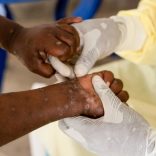Mozambique: UN torture prevention body to visit the second time
Mozambique ranks 182nd, five other CPLP countries rise in Human Development Index

Image: UNDP
Six of the nine members of the Community of Portuguese Language Countries (CPLP) have risen in the UN Human Development Index ranking, with Portugal remaining among the Very High HDI countries and Guinea-Bissau and Mozambique among the Low HDI countries .
The data are contained in the Human Development Report released on Tuesday by the United Nations Development Programme (UNDP), which shows that, among Portuguese-speaking countries, only Cabo Verde fell in the Human Development Index ranking, from 131st to 135th, in an assessment that focuses on the performance of countries in 2023.
In a ranking led by Iceland, Portugal now occupies 40th place, up from 42nd in the previous report, followed by Brazil in the list of CPLP countries with the best index, rising from 89th to 84th place.
Equatorial Guinea remained in 133rd place, Cabo Verde fell from 131st to 135th, São Tomé and Príncipe remained in 141st place and Timor-Leste rose from 155th to 142nd place.
Also on the list of Portuguese-speaking countries that rose in the UNDP ranking are Angola, which rose from 150th to 148th, Guinea-Bissau (from 179th to 174th) and, finally, Mozambique, which rose one position (from 183rd to 182nd).
Portugal is the only Portuguese-speaking country in the ‘Very Hugh’ Human Development category, Brazil is the only one in ‘High’, and Equatorial Guinea, Cabo Verde, São Tomé and Príncipe, Angola and Timor-Leste are on the list of countries that recorded ‘Medium’ Human Development.
Guinea-Bissau and Mozambique are the CPLP members included in the ‘Low’ Human Development category, which is closed by South Sudan in last place (193rd).
Sub-Saharan Africa is chronically the region with the lowest Human Development Index ranking in the world.
The data is included in the ‘2025 Human Development Report -“A matter of choice: people and possibilities in the age of Artificial Intelligence (AI)”’ – which analyses progress on a range of indicators known as the Human Development Index (HDI), which encompasses achievements in health, education and income levels.
Starting NOW!
Launch of our Human Development Report #HDR2025 in Brussels.
Join @ASteiner, @prevotmaxime, @vonderleyen and leading experts for a conversation on how AI can advance human potential and well-being: https://t.co/7kifyNEMjh pic.twitter.com/4FQjY1MqHr
— UN Development (@UNDP) May 6, 2025
The document reveals stagnation in the HDI in all regions of the world, while showing that Artificial Intelligence (AI) “can reactivate development”.
Instead of a sustained recovery after the exceptional crises of 2020-2021, the report reveals ‘surprisingly weak’ progress.
Excluding the crisis years of the Covid-19 pandemic, “the meagre rise in global human development projected in this year’s report is the smallest increase since 1990,” the document says, pointing to a widening gap between rich and poor countries.
For the fourth year in a row inequality between Low HDI and Very High HDI countries continues to increase, reversing a long-term trend that has seen a reduction in inequalities between wealthy and poor nations.
“Amidst this global turmoil, we must urgently explore new ways to drive development,” said UNDP global chief Achim Steiner, pointing to the potential of Artificial Intelligence: “While AI is no panacea, the choices we make hold the potential to reignite human development and open new pathways and possibilities”.
The availability of data for AI development in a country depends on several factors, such as data availability, which varies considerably between countries and regions.
According to the report, Sub-Saharan Africa is making progress in data availability and infrastructure, but still has major gaps.
These disparities stem from differences in government commitment to open data, data management capabilities and access to technology.
In March 2024, the United States hosted about half of the world’s data centres, reflecting the concentration of this infrastructure.
“Although cloud computing loosens the link between the physical location of data centres and the use of data, only 5% of AI talent in Africa has access to the computing power for complex AI tasks,” the report stresses.
However, the democratisation of AI is already underway, says the report, noting that about one in five respondents reported already using Artificial Intelligence.













Leave a Reply
Be the First to Comment!
You must be logged in to post a comment.
You must be logged in to post a comment.